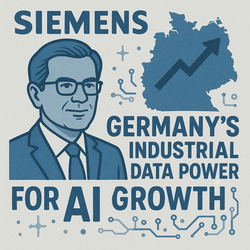Berlin — Siemens CEO Roland Busch has spotlighted Germany’s vast industrial data as a key driver in the country’s ambition to become a global leader in artificial intelligence (AI). Speaking at a recent tech forum, Busch emphasized that Germany’s wealth of structured, high-quality industrial data could provide a strategic advantage in developing advanced AI systems for real-world applications.
According to Busch, Germany is uniquely positioned due to its long-standing expertise in engineering and manufacturing. The country’s industrial sectors — from automotive and energy to logistics and automation — generate immense volumes of operational data that can be used to train powerful, domain-specific AI models.
“While consumer tech companies dominate the AI headlines, the real value lies in AI that can improve industrial productivity, safety, and efficiency,” Busch said.
Siemens, one of Germany’s largest technology firms, is already using AI in its operations to enable predictive maintenance, optimize factory processes, and manage smart energy systems. The company believes that AI trained on real-world industrial data has the potential to transform how machines, systems, and infrastructure operate globally.
Busch urged German policymakers and businesses to act quickly. He warned that although Germany has a strong data foundation, it risks falling behind in global AI competition without targeted investment in AI infrastructure, data-sharing networks, and skills development.
“We need an ecosystem where data from industry is not just stored, but actively used to create intelligent systems that solve real problems,” he added.
Experts agree that Germany’s strength lies in business-to-business (B2B) applications of AI, rather than consumer tools. With growing global interest in industrial automation and smart manufacturing, Germany’s data advantage could help the country shape the future of AI-driven industry.
As Siemens continues to expand its AI capabilities, the message is clear: Germany’s industrial legacy is not just history — it’s the backbone of its AI-powered future.
